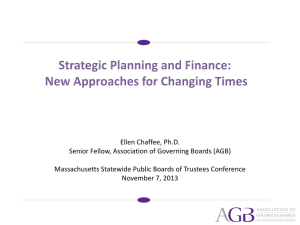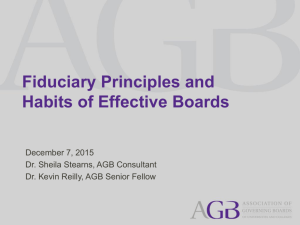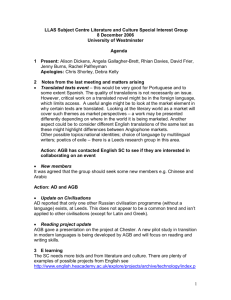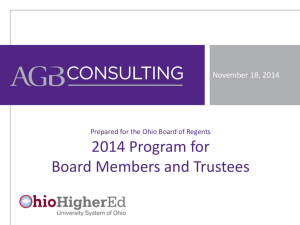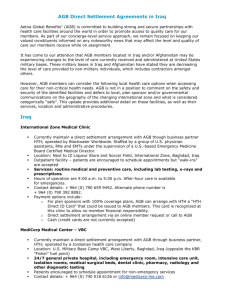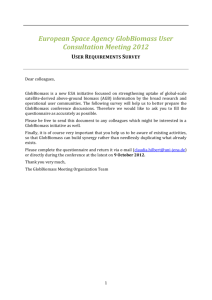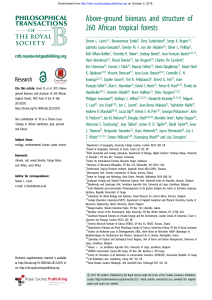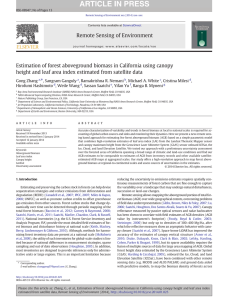U.S. Higher Education Overview
advertisement
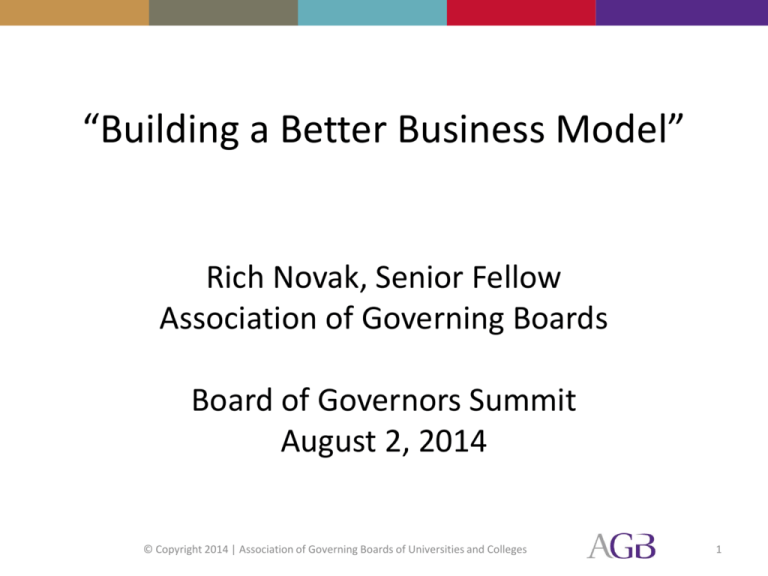
“Building a Better Business Model”
Rich Novak, Senior Fellow
Association of Governing Boards
Board of Governors Summit
August 2, 2014
© Copyright 2014 | Association of Governing Boards of Universities and Colleges
1
Reasons for Re-thinking the
Business Model
• Unpredictable and unstable state fiscal
environment
• Approaching a ceiling on tuition
charges and affordability
• Federal research dollars at risk
2
A New Business Model
• May entail significant changes for some
institutions
• Tweaks of existing model for others
• No one model for all
© Copyright 2013 | Association of Governing Boards of Universities and Colleges
3
Consider a “Strategic Finance”
approach – aligning all resources
with mission, vision and
strategic plan
• Examine costs and revenues
• Non-academic and academic
• Focus on student outcomes: resources
for student success (remediation,
academic advising, undergraduate
curriculum)
4
“Strategic Finance” approach –
aligning all resources with mission,
vision and strategic plan
• Make decisions based on data and
evidence, and on cost as well as
anticipated benefit
• Know cost and revenue drivers
5
Framework for a New Business
Model: Managing Costs
Focus on “cost effectiveness,” not just
budget-cutting by:
1) reducing spending in areas least
damaging to access and attainment
From “{Improving Cost-Effectiveness: Leadership Challenges for Public Higher Education”
by Jane Wellman and Ellen Chaffee
6
Framework for a New Business
Model: Managing Costs
2) increasing the proportion of students
who complete degrees, and reducing the
costs of degree production
3) reinvesting in core academic capacity
From “{Improving Cost-Effectiveness: Leadership Challenges for Public Higher Education”
by Jane Wellman and Ellen Chaffee
7
Managing Costs: increasing
productivity and efficiency in
administrative areas
• Consolidate back-office functions
among departments and colleges
• Consider shared services among with
sister institutions
• Pay special attention to employee
benefits
8
Managing Costs: increasing
productivity and efficiency in
academic areas
• Benchmark academic cost structures
• Incentivize innovation,
entrepreneurship, and partnership
• Engage faculty
• Focus on positive student outcomes
9
Framework for a New Business
Model: Enhancing Revenues
• Understand what the economic engines
are for the institution
• Know top programs by FTE
• Know top programs by net revenue
generation
• Incentivize innovation,
entrepreneurship, and partnership
From ”How to Review Your Business Model: Some Best Practices in March/April 2013 AGB
Trusteeship Magazine, by Rick Staisloff, rpk consulting, and AGB Consultant
10
Framework for a New Business
Model: Enhancing Revenues
• Mission: What are we good at?
• Market: What do people want?
• Margin: How do we bring these
together in a way true to mission and
generates resources?
From ”How to Review Your Business Model: Some Best Practices in March/April 2013 AGB
Trusteeship Magazine, by Rick Staisloff, rpk consulting, and AGB Consultant
11
Framework for a New Business Model:
Enhancing Revenues
Mission
Market
12
Margin
The business
model is your
institution’s plan
to generate and
sustain revenue so
that it can meet
its expenses while
bringing value to
stakeholders.
Structure for a Business Model
Review
• Creative a baseline of data
• Appoint a Leadership Team (include
faculty and staff)
• Develop a communication plan
• Board engagement is critical
From ”How to Review Your Business Model: Some Best Practices in March/April 2013 AGB
Trusteeship Magazine, by Rick Staisloff, rpk consulting, and AGB Consultant
13
Implementing a New Business
Model
Develop metrics:
1) Key Performance Indicators
2) Dashboard indicators
3) Comparison groups
From ”How to Review Your Business Model: Some Best Practices in March/April 2013 AGB
Trusteeship Magazine, by Rick Staisloff, rpk consulting, and AGB Consultant
14
Some Institutional Examples
15
Thank You
Rich Novak
AGB Senior Fellow
RichN@agb.org
16
